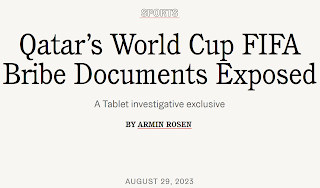 |
| Roof collapsed by snow (illustrative; not this case). Richard Allaway via Flickr CC BY 2.0 |
On that distinctive fact pattern, the court's thorough opinion gave textbook treatment to issues in worker compensation, conflict of law, and premises liability.
The defendant Massachusetts landowner hired a Rhode Island home improvement company to raze a garage collapsed by snow. Hired in turn by the company, the plaintiff found the garage in its dilapidated state and expressed reservations about safety. As the plaintiff inspected the structure, it further collapsed and pinned him, inflicting bilateral fractures to both legs.
The plaintiff ultimately recovered $19,000 from R.I. worker comp. For further recovery, he sued the company, the company principal, and the landowner. The Appeals Court affirmed dismissal for all defendants.
Worker compensation scope: Worker comp covers employees, not independent contractors. R.I. worker comp initially rejected plaintiff's claim on the grounds that he was an independent contractor rather than an employee. Later evidence indicated that the plaintiff might have signed a document acknowledging status as an independent contractor. Nevertheless, the plaintiff sued over the question. The worker comp system settled for $19,000.
The exclusion of independent contractors from worker comp renders a significant gap in the American social safety net. Highly regulated industries might require that independent contractors self-insure. But a legion of workers, especially in the gig economy, works in a gray area with no contingency for catastrophic loss. The situation is worsened by industry's increased reliance on, and sometimes exploitation of, independent contractors, facilitated in part by the post-pandemic upswing in remote work.
America's runaway healthcare costs and lack of universal medical insurance compound the independent contractor's woes when injury does occur. I imagine that $19,000 did not come close to covering the plaintiff's bills for such serious injury. Plaintiff's attorney fees must be accounted for as well. The plaintiff here might have acknowledged contractor status and aimed for a better settlement against an insurer, if available, for the company or homeowner. That would have been a gamble. The top takeaway for contractors or their attorneys is that self-insurance is a necessary cost of doing business.
Worker compensation bar: One who recovers in worker comp surrenders tort claims against the employer and its agents. The fundamental premise of worker comp is that it supersedes, so bars, tort claims. The plaintiff tried to augment the worker comp recovery by suing the company principal and the landowner. The plaintiff also sued the company itself upon a theory that did not pan out on the facts, that misrepresentation of the condition of the property vitiated the worker comp bar.
The plaintiff's claim necessarily failed against the company principal. The worker comp bar naturally extends to the agents of the employer, besides the company. Employers usually—though not necessarily; caution by an employee entering into the contract of employment always is advisable—indemnify their employees for negligence in the scope of employment. Plaintiffs outside the workplace usually are more interested in pursuing employers than employees, because the employer has more money and an insurer. If a plaintiff could pursue an employer's agents, the worker comp bar would be undermined.
The worker comp bar also undoes the largely historical common law "fellow servant" rule, which released an employer from responsibility for an injury inflicted on one employee by another, but thereby cleared the way for an employee to sue a co-worker. Relieving workers of the harsh consequences of that rule in the age of industry was in fact a key reason the worker comp system came about in America.
Why America has a worker comp system, why it remains narrow in scope, and how it's been diminished by reforms in recent decades are all fascinating stories in their own rights. New Zealand's unusually broad accident compensation system, which substantially supersedes tort litigation over accidents, grew out of worker comp reform in the 1970s. Suffice to say here and now, in its core scope of application, worker comp is a "grand bargain" in which employers fund the system proactively in exchange for workers' surrender of tort claims. That's good for workers in theory, but raises, again, the problem that worker compensation schedules have not kept up with the skyrocketing costs of living and healthcare.
Conflict of laws: the worker comp bar is practically universal vis-à-vis employers and their agents. The plaintiff tried as well to circumnavigate the worker comp bar upon the theory that worker compensation was paid by the company's R.I. worker comp insurer, and that the R.I. worker comp bar does not necessarily preclude tort claims in Massachusetts.
The plaintiff was right that Massachusetts law applied to the case. Upon conflict-of-law analysis to ascertain the state with predominant interest in the matter, the court agreed that an injury in Massachusetts arising from the condition of a premises in Massachusetts drew Massachusetts substantive law to the problem.
Nevertheless, the court recognized the applicability of the R.I. worker comp bar. The Restatement (Second) of Conflict of Laws opines that a worker comp bar should apply to action in any state. And both Rhode Island and Massachusetts observe both the worker comp bar and its application to companies and their agents. Thus, Massachusetts public policy bore no hostility to importation of the R.I. rule, even to prelude tort claims under Massachusetts substantive law.
Premises liability: A landowner cannot be liable to an invitee for a known dangerous condition when the invitee was invited for the very purpose of abating the dangerous condition. The worker comp bar does not preclude claims against third parties to the employment relationship. The third party is not part of the grand bargain. Indeed, under state law, typically, an employee or a worker comp system in subrogation may allege a third party's responsibility for loss. An employee successful in litigation might owe reimbursement to the worker comp system. Correspondingly, a worker comp system might owe excess recovery to the employee. Here, then, the worker comp bar did not preclude the plaintiff's suit against the landowner in negligence.
The defendant landowner asserted that the dangerous state of the collapsed garage was "open and obvious," thus invoking a historical common law doctrine. The fuzzy doctrine has been said to mean many things in many scenarios. In the instant case, the defendant invoked the doctrine to say that the obvious risks of the dilapidated garage should relieve the landowner of the usual responsibility owed to a commercial invitee.
Similarly, the contemporary approach is to reject "open and obvious" as any kind of magical incantation. Rather, the openness and obviousness of the risk also is part of what a court and jury can be expected to consider in the reasonableness analysis. Here, the court ruled accordingly that "open and obvious" is not a rule per se.
However, "open and obvious" remains important as a matter of fact. And on these facts, the openness and obviousness of the risk of the collapsed garage proved dispositive—not because of a blanket rule favoring defendants, but because of the specific reason the plaintiff was invited to the property: to abate the very same risk. The court reasoned:
The [cited] authorities encompass the commonsense recognition that a landowner who has a hazardous condition on his or her property may need to invite onto the property another person or persons to remedy that condition. The law, of course, wishes to encourage behavior that remedies hazardous conditions.... And the person engaged to remedy such a hazardous condition differs markedly from an ordinary invitee. For one thing, there usually will be little question that such a person is aware of the danger, and thus there should be no need for warning. Furthermore, such a person will have held him- or herself out as capable of remedying the condition. Under those circumstances, it is reasonable for the law to reallocate the risk of harm from the property owner to the person who has sought to take on, and to alleviate, the hazard.
The case is Ward v. Schnurr, No. 22-P-372 (Mass. App. Ct. Sept. 13, 2023). Justice John Englander wrote the unanimous opinion of a panel that also comprised Justices Henry and Desmond.
,_AD_160-180,_bronze_-_Worcester_Art_Museum_-_IMG_7704.JPG)
































